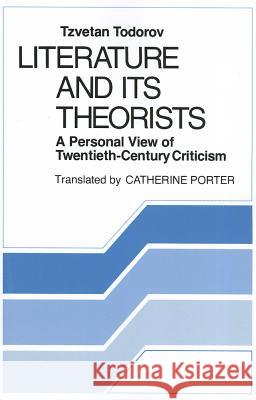Literature and Its Theorists: A Personal View of Twentieth-Century Criticism » książka
Literature and Its Theorists: A Personal View of Twentieth-Century Criticism
ISBN-13: 9780801495533 / Angielski / Miękka / 1989 / 203 str.
Part history, part confession, part manifesto, Literature and Its Theorists is Tzvetan Todorov's bold statement of what literature is and what criticism should be, and is the final volume in Todorov's trilogy devoted to the theory and tradition of literary criticism, which also includes Theories of the Symbol, and Symbolism and Interpretation. This book represents the contemporary ideological debate in criticism as an opposition between classical dogmatism and modern relativism, or nihilism.Todorov seeks to break out of this paralyzing dichotomy and to achieve a morally committed criticism that offers the possibility of transcending extreme relativism without retreating into dogmatism, of opposing nihilism without ceasing to be an atheist. Todorov undertakes analytical portraits of major writers in four critical traditions: the Russian Formalists and Mikhail Bakhtin; the Germans Alfred Doblin and Bertolt Brecht; Jean-Paul Sartre, Maurice Blanchot, Roland Barthes, and Paul Benichou from France; and the Anglo-American critics Northrop Frye and Ian Watt.Asserting that the modern aesthetic is dominated by the Romantic ideology which divorces textual meaning from any reference to truth, Todorov considers how each author's work either remains within or challenges and moves beyond the Romantic framework. Finally, Todorov promotes the idea of criticism as a dialogue in which both author's and critic's voices are allowed to be heard as equals in the pursuit of truth. Through his personal, self-reflexive method which includes "conversations" with Watt and Benichou, Todorov present Literature and Its Theorists as an example of "dialogic" criticism, and his own critical career as an object of such criticism.He thus offers Literature and Its Theorists as a bildungsroman, an account of his own attempts to think beyond Romanticism through a series of authors with whom he identifies in turn, a yet-to-be concluded novel of his apprenticeship in criticism. This English-language edition concludes with an appendix written in response to reactions to the French edition, two provocative essays that clarify Todorov's perception of traditional literary history, and his assessment of contemporary criticism."











